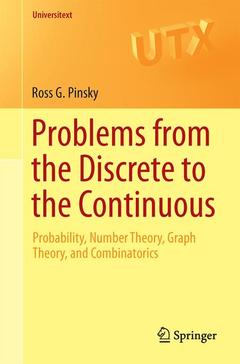Description
Problems from the Discrete to the Continuous, 2014
Probability, Number Theory, Graph Theory, and Combinatorics
Universitext Series
Author: Pinsky Ross G.
Language: English
Subjects for Problems from the Discrete to the Continuous:
Keywords
Asymptotic problems; Combinatorics; Graph theory; Number theory; Probability
154 p. · 15.5x23.5 cm · Paperback
Description
/li>Contents
/li>Biography
/li>Comment
/li>
Partitions With Restricted Summands or "The Money Changing Problem".- The Asymptotic Density of Relatively Prime Pairs and of Square-Free Numbers.- A One-Dimensional Probabilistic Packing Problem.- The Arcsine Laws for the One-Dimensional Simple Symmetric Random Walk.- The Distribution of Cycles in Random Permutations.- Chebyshev's Theorem on the Asymptotic Density of the Primes.- Mertens' Theorems on the Asymptotic Behavior of the Primes.- The Hardy-Ramanujan Theorem on the Number of Distinct Prime Divisors.- The Largest Clique in a Random Graph and Applications to Tampering Detection and Ramsey Theory.- The Phase Transition Concerning the Giant Component in a Sparse Random Graph–a Theorem of Erdős and Rényi.




